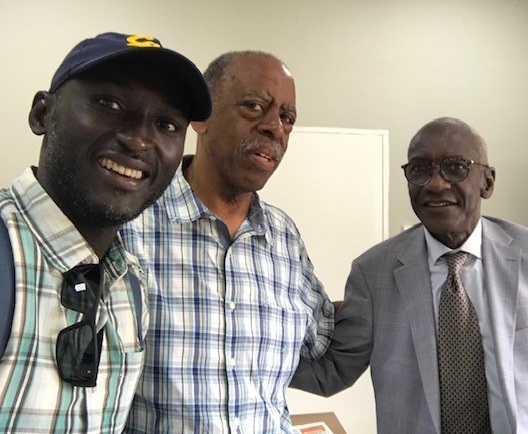When Social Scientists Get Together: An Educational Experience in The Gambia

Connections made at the College of Marin (COM) are worth traveling to globe to reconnect, just ask Social Sciences Instructor Walter Turner and his former student Kunta Kambi.
Kambi graduated from College of Marin in the spring of 2019 and now remotely attends the University of California, Berkeley. The former political science major lives in his home country of The Gambia, West Africa.
The Gambia, a country of 2 million people, is the smallest non-island country in Africa. It consists of a strip of land surrounding the Gambia River that is 300 miles long and 15 to 30 miles wide. Besides the coastline along the Atlantic Ocean, The Gambia is completely surrounded by Senegal.
The country’s unusual shape is a result of competing colonial interests between the United Kingdom and France, but many like to think it got its shape from how far English ships could shoot their cannons to defend the rights along the Gambia River, a major trading destination.
Its name has colonial roots, too. Thought to have come from the Portuguese word cambio meaning ‘exchange’ or ‘trade,’ it was and still is a major commerce center. The Gambia is one of only a handful of countries that use the article ‘the.’ It was added after it became an independent nation from the U.K. in 1965 to differentiate it from the newly independent Zambia, formerly Northern Rhodesia, as they kept getting Zambian mail.
In August 2019, Professor Turner was visiting friends and family in Dakar, Senegal – a mere 115 miles as the crow flies from Kambi’s home in Brikama, Gambia. After an eleven-hour bus ride around the winding roads of Senegal and a short ferry ride across the River Gambia, Turner was reunited with his student.
“When I arrived, Kunta was waiting at the docks proudly wearing his University of California, Berkeley t-shirt,” Mr. Turner remembered fondly. “We spent some time shopping for fabric in Banjul, and then headed toward his home in Brikama.”
In a show of extraordinary West African hospitality, Kambi and his family accommodated his former professor in their master bedroom with all the amenities he needed. “Kunta’s wife Natasha, his daughter Aisha, and his other children were outstanding hosts,” said Turner. “We had great meals and conversations. And, we sat under the trees with friends eating fresh mangos and drinking Gambian brewed tea.”
But the visit wasn’t all lazy days eating delicious fruit under shady trees; the two social scientists sprinkled in their own kind of fun as well.
The pair took time to visit the beaches, watch the fishing boats, walk the streets, talk soccer with Kambi's community, and “investigate sites where multinationals were perhaps violating environmental laws,” said Turner.
The professor’s visit happened to coincide with The Gambia’s Truth and Reconciliation Hearings in the aftermath of the regime of former President Yahya Jammeh, who was forced out of office in 2017. They were honored to meet with the chair of the Truth and Reconciliation Commission, Dr. Lamin Sise (pictured above with Kambi and Turner), a former director of the United Nations’ Office of Legal Affairs, Human Rights, and Special Assignments. Born in The Gambia, Dr. Sise received his doctorate from Johns Hopkins University and worked on other reconciliation commissions in Kenya and Syria with former U.N. Secretary-General Kofi Annan. He worked with Dr. Annan for twenty-five years as his executive assistant, senior adviser, and close confidant.
During the hearings, the two met with political scientists, educators, and social activists, including Madi Jobarteh, a well-known Gambian human rights activist, democracy promoter, and newspaper columnist, who returned to The Gambia in 2017 after being forced into exile. He deepened their knowledge and passion for local activism. Turner remarked how Madi, with his spirited voice, “represented the optimism of and the challenges of rebuilding a country after more than 20 years of dictatorial rule.”
They met many other journalists and activists, as well, including hearing one journalist’s story of living in exile from The Gambia over the last 10 years, as other journalists who stood up to the president were being tortured and killed.
At every session, Turner found that Kambi would proudly extoll his time at COM. “He would praise the College of Marin faculty and the support that was he was given through Alpha Gamma Sigma, Umoja, and the MAPS [Mapping Academic Pathways to Success] program,” said Turner. The young man’s passion for Political Science and International Affairs shone through as he highlighted his participation in the Model United Club at COM.
A few days later, Kambi transported his former professor to the bus at 6 a.m. and the two parted ways yet again. Turner made the eleven-hour journey back to Dakar filled with memories of the Gambian sights, smells, and stories to which his former pupil had introduced him. It was then he realized just how much he had gained from his former student and how much it had enriched his life, just as he had cultivated Kambi’s.
“It was wonderful to see the impact of what we do on our students as they prepare to move on to four-year institutions and careers beyond academia,” Turner said, in a written reflection. “It’s even more satisfying that their success at College of Marin is the best advertisement for our institution.”
“Ashe,” he concluded—a West African concept meaning “so be it.”
Ashe.
